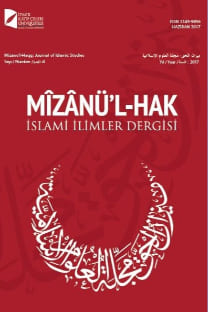Farabi’de İlahi Basitlik
The Divine Simplicity in al-Fārābī
Al-Fārābī, One, God, Oneness, Simplicity, Divine attributes, the First Cause,
___
- al-Fārābī, Abū Na r. Al-Madīna [The Virtuous City], Al-Farabi on the Perfect State: Abū Al-Fārābī’s Mabādi ‘Ārā‘ Ahl Al-Madīna , A Revised Text with Introduction, Translation, and Commentary by Richard Walzer, USA: Great Books of the Islamic World, 1998.
- al-Fārābī, Abū Na r. Kitāb al-Siyāsa al-Madaniyya, al-Mulaqqab bi-Mabādi‘ al-Mawjūdāt, ed. F. M. Najjar. 2nd ed. Beirut: Dar al-Mashriq, 1993.
- al-Fārābī, Abū Na r. Kitāb wa (On the One and Oneness), Ed. Muhsin Mahdi. Casablanca: Les Editions Toubkal, 1989.
- Anselm of Canterbury. Monologion in Complete Philosophical and Theological Treatises of Anselm of Canterbury, Translated by Jasper Hopkins and Herbert Richardson. Minneapolis: The Arthur J. Banning Press, 2000.
- Aquinas, Thomas. Summa Theologica (Also Summa theologiae), Translated by the English Dominican Fathers. New York: Benziger Brothers, 1947. Augustine. On the Trinity, Translated by Stephen McKenna. Washington DC: Catholic University of America Press, 1963.
- Burns, Peter. “The Status and Function of Divine Simpleness in Summa theologiae Ia, qq.2–13.” Thomist 57/1 (1993): 1–26.
- E. Mann, William. “Divine Simplicity.” Religious Studies. 18/4 (Dec. 1982): 451-471.
- Fakhry, Majid. Al-Fārābī Founder of Islamic Neoplatonism: His Life, Works and Influence. Oxford: Oneworld Publication, 2002.
- Janos, Damien. “Al-Farabi’s On the One and Oneness: Some Preliminary Remarks on its Structure, Contents, and Theological Implications.” The Oxford Handbook of Islamic Philosophy. Ed. Khalid El-Rouayheb and Sabine Schmidtke, Oxford: Oxford University Press, 2016: 101-128.
- Leftow, Brian. “Is God an Abstract Object?” Noûs 24/4 (1990): 581–98.
- Reçber, Mehmet Sait. “Farabi ve Tanrı’nın Basitliği Meselesi.” Uluslararası Farabi Sempozyumu Bildirileri içinde. Bu bildiri Ankara’da 7-8 Ekim 2014 tarihleri arasında Uluslararası Farabi Sempozyumu’nda sunulmuştur. Ankara: Elis Yayınları, 2005.
- Reisman, David C. “Al-Farabi and the Philosophical Curriculum.” The Cambridge Companion to Arabic Philosophy, Ed. Peter Adamson and Richard C. Taylor. Cambridge, UK: Cambridge University Press, 2005: 52-71.
- Plantinga, Alvin. Does God Have a Nature? Milwaukee, WI: Marquette University Press, 1980.
- Weigel, Peter. Aquinas on Simplicity: An Investigation into the Foundations of His Philosophical Theology. Frankfurt: Peter Lang, 2008.
- Weigel, Peter. “Divine Simplicity.” The Internet Encyclopedia of Philosophy. Erişim 20.03.2017. http:// www.iep.utm.edu/home/about/
- ISSN: 2149-9896
- Yayın Aralığı: 2
- Yayıncı: İzmir Kâtip Çelebi Üniversitesi İslami İlimler Fakültesi
Muhafazakâr Yahudilik Siyonizm İlişkisi
Adnan DEMİRCAN Cahiliye Arapları
Japon Dinî Bayramlarının Genel Özellikleri ve Sosyal Hayattaki Yeri
I. Uluslararası Engellilik ve Din Sempozyumu
Tuhfetü’l-Mürîd ve Ravdatü’l-Ferîd ve Fevâidü Li-Ehli’l-Fehmi’s-Sedîd ve’n-Nazari’l-Mezîd Tercümesi
Hamide ULUPINAR, İzzet MARANGOZOĞLU
Beyânî Tefsirin Doğuşu ve Gelişimi
Mahmut ZENGİN Din, Ahlâk ve Değerler Öğretimi için Eğitsel Oyunlar
